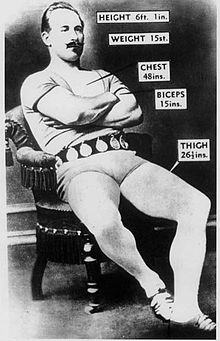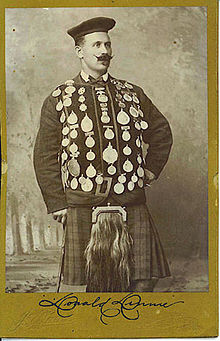- Donald Dinnie
-
Donald Dinnie Born Donald Dinnie
1837
 Birse, Scotland
Birse, ScotlandDied 1916 (age 79) Occupation Highland Games Strongman Height 6 ft 1 in (1.85 m) Weight 210 pounds (95 kg) Competition record Highland Games Competitor for  Scotland
ScotlandScottish Highland Games Championships Champion 1856 Champion 1857 Champion 1858 Champion 1859 Champion 1860 Champion 1861 Champion 1862 Champion 1863 Champion 1864 Champion 1865 Champion 1866 Champion 1867 Champion 1868 Champion 1869 Champion 1870 Champion 1871 Champion 1872 Champion 1873 Champion 1874 Champion 1875 Champion 1876 Donald Dinnie (1837–1916) was a Scottish strongman, born at Balnacraig, Birse, near Aboyne, Aberdeenshire. He has been recognized as "The Nineteenth Century's Greatest Athlete".[1] Dinnie's athletic career spanned over 50 years, and over 11,000 successful competitions.
Contents
Biography
Early feats
Donald Dinnie, the son of a stonemason, won his first sporting event, at the age of 16, in the nearby village of Kincardine O'Neil. He defeated the local wrestling strongman David Forbes, and took first place which included £1 prize money. In 1860, Dinnie undertook a feat of strength that was to give birth to a long-lasting legacy. He carried two boulders, with a combined weight of 775 pounds (352 kg), for a distance of about 5 yards (4.6 m), across the Potarch Bridge and back. Each boulder had an iron ring fixed to it, so that scaffolds could be attached from which workmen could repair the bridge, over the River Dee near Kincardine O'Neil.[2] The original stones are now located outside the 18th-century Potarch Hotel, on the south bank of the river by the Potarch Bridge.
Sporting career
As time passed, Dinnie became an all-round athlete, growing and building his skills over a 20-year reign as Scottish champion (1856–1876). He excelled in sprint, hurdles, long and high jump, pole vault, putting the stone, hammer throw, tossing the caber and wrestling. Comparing his best performances, which took place long before the Athens Olympics of 1896, leads one to imagine him capable of winning seven gold, a silver, and a bronze medal.[citation needed] However, by 1896, Dinnie was approaching the twilight of his sporting career.
Dinnie was a 19th-century superstar, with widespread fame, success, and riches. Dinnie held the title "World Champion Wrestler", and obtained the unofficial titles of "Greatest Athlete in the World", and "Strongest Man in the World".[citation needed] He was so well-known that "heavy artillery shells in the First World War were nicknamed 'Donald Dinnies.'"[2] This man brought fear into the United States. Not only did he intimidate the American strongmen, but in addition he also captured most of the world's attention as well. His documented achievements worldwide consist of "2,000 hammer throwing contests, over 2,000 wrestling matches, 200 weightlifting contests, and about 500 running and hurdle events. He also made a good living at all this, earning at least £25,000 in his career, a sum that would be worth about US $2.5 million today. And to this day his image continues to endorse commercial products in Scotland."[2]
Touring athlete
As Scotland's greatest athlete, Dinnie competed in sixteen Highland Games seasons in his native land. He first toured the United States' Caledonian Circuit in 1870.[2] In that year he earned a fortune. Dinnie, then thirty-three, was titled "The Nineteenth Century's Greatest Athlete".[citation needed] However, others despised and criticized Dinnie for his incredible strength. He continued to tour, and in his 60th year he was in New Zealand and Australia as a successful professional athlete.
Donald continued to be involved in theatres and at Highland Games as a judge, or in veteran events, until 1912. In 1903 Robert Barr invited him to endorse his soft drink Iron Brew, using Donald's image on the label with Donald proclaiming "I can recommend BARR's IRON BREW to all who wish to aspire to athletic fame, signed Donald Dinnie, All-round Champion Athlete of the World."[2] Later in Donald's life he struggled financially, and in his 70's was still performing as a strongman in London. His act was to support a platform made from a large table while two Highlanders danced a "fling" on it. Eventually London authorities terminated his performing licence because of his advanced age. To help with his, situation a benefit concert was organised, which provided Dinnie with a small annuity.
Family
Donald and his family lived in Glasgow, where they owned a fish and chip restaurant and tea-room in the Govan area. They then lived for 2–3 years in Newcastle, before finally settling in London where Dinnie died in 1916, aged 78 years. In the United States 'The New York Times paid tribute in the paper's obituary column.
In 2002, Donald Dinnie was inducted into the Scottish Sports Hall of Fame in Edinburgh. Donald's relative Gordon Dinnie accepted a cut glass trophy on Donald's behalf. Gordon Dinnie also still owns an original astrakhan breastplate that carries 19 medals won by Donald Dinnie from 1860 to 1896. A 23 inches (58 cm) carved statuette of Donald Dinnie, engraved with the words "Presented to Donald Dinnie, Champion Athlete In Appreciation of his Athletic Prowess, by his Scotch Friends, In Newcastle 1870", is in the Aberdeen Art Gallery along with many of Dinnie's medals.
Titles
-
- World Champion Wrestler
- Scottish Champion; 1856-1876
- Strongest Man in the World
- Greatest Athlete in the World
See also
- Angus MacAskill
- Angus Graham (strongman)
- Stone put
- Hammer toss
- Weight for Distance
- Weight for Height
- Sheaf toss
References
- ^ Zarnowski, Frank. "The Amazing Donald Dinnie: The Nineteenth Century’s Greatest Athlete". Iron Game History 5 (1): 3–11. http://www.la84foundation.org/SportsLibrary/IGH/IGH0501/IGH0501c.pdf. Retrieved 2009-04-02.
- ^ a b c d e "Donald Dinnie". A Sporting Nation. BBC. http://www.bbc.co.uk/scotland/sportscotland/asportingnation/article/0015/. Retrieved 2009-04-02.
- Webster, David. "Reconsidering Donald Dinnie". Iron Game History 5 (2): 18–21. http://www.la84foundation.org/SportsLibrary/IGH/IGH0502/IGH0502d.pdf. Retrieved 2009-04-02.
External links
- Rules of the Scottish-American Athletic Association (PDF file - 819 KB)
- Donald Dinnie entry at the Scottish Sports Hall of Fame
- Famous Scotland competitions and competitors
- stained glass window commemorating Donald Dinnie
Categories:- 1837 deaths
- 1916 deaths
- People from Aberdeenshire
- Scottish highland games competitors
- Scottish wrestlers
- Strongmen
- 1837 births
-
Wikimedia Foundation. 2010.


